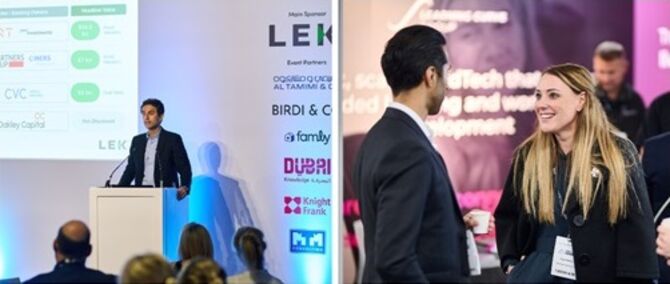Buoyant international education sector revealed at Education Summit
The Education Summit held in London on 16 October opened in buoyant style with the opening address from Ashwin Assomull, Partner and head of global education practice, L.E.K. Consulting.

 20 October 2025
20 October 2025Read related articles
- Exam success
- Beyond the Campus Gates
- The path to AI empowerment
- Demand for international education soars
Do these private schools actually deliver?
Through the course of all the work that L.E.K has been doing over the last 15 years, what we've seen he emphasised, is that private schools are delivering both in terms of grades, and across geographies, you'll see academic outcomes outperform in private schools versus public competitors. You can see the public sector are not able to invest in their public systems. They are not keeping up and in line with inflation, and parents are voting with their feet as a result.All the analysis that we've done shows that fee growth, whilst it may be in line and sometimes above inflation, it typically tracks below income growth for the top decile households, which are the households that are affording this type of education.So if your incomes are growing at 7% or 8% which they are in certain markets, and your fees are growing at 4% and 5% you're still happy to pay that, because you are getting a quality product, and you are getting those academic outcomes that you want to make sure that your kids get into the best universities.In a later session L.E.K Principal, Nikita Rajgopal, reinforced the point around, ‘What do parents really care about?’ She explained that L.E.K. have conducted a survey of more than 3500 parents globally, and tuition fees actually ranks sixth in the most important criteria for parents. What do they really care about? They care about academic quality. They care about academic outcomes, and they care about the teaching quality at schools. And this is exactly where private wins, she said.
Higher Education
Economies need to invest in higher education if they want to become richer. There is a very clear correlation between GDP growth and the gross enrolment ratio. L.E.K. been tracking for the best part of a decade, and where governments are not investing in higher education systems across the world, again, the private system is coming in.What's important is they're delivering jobs to their students and employability. So, these institutions are focusing on what students want, and as a result are growing, and it's what actually, governments want. So, governments are making it easier for private education to set up across emerging markets and developed markets.AI and continuous learning
There are real opportunities with changes in AI technology coming in, there's a real need for upskilling. He explained, it's not just about typical undergrad and post grad, but there are opportunities in continuous education too.There is no doubt that K12 International Education is a growth sector offering exceptional education opportunities for young people around the world. The Summit explored markets including SE Asia, India, Middle East and North America as well as the growing interest in Early Years and SEND provision. We will highlight more trends across this vibrant sector in our next online International Education & Schools’ Fair 4-10 November designed to support the admissions cycle for international parents and the employers and global mobility professionals supporting their moves as well as the fast paced education sector.


Find out more about the Think Global People and Think Women community and events.
Subscribe to Relocate Extra, our monthly newsletter, to get all the latest international assignments and global mobility news.Relocate’s new Global Mobility Toolkit provides free information, practical advice and support for HR, global mobility managers and global teams operating overseas.
©2026 Re:locate magazine, published by Profile Locations, Spray Hill, Hastings Road, Lamberhurst, Kent TN3 8JB. All rights reserved. This publication (or any part thereof) may not be reproduced in any form without the prior written permission of Profile Locations. Profile Locations accepts no liability for the accuracy of the contents or any opinions expressed herein.































